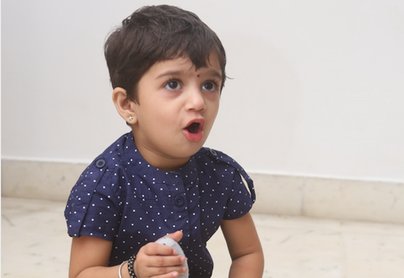Why Montessori Education?
Early childhood education is the key to the betterment of society.
– Dr Maria Montessori
Dr Maria Montessori, a physician, anthropologist and pedagogue, developed this unique method of educating children over a professional career that spanned over fifty years. The Montessori approach was developed through intense scientific observation of children from many ethnic, cultural and socio-economic backgrounds from birth to maturity. It is based upon a deep understanding of child development.
She believed in children’s natural curiosity to learn and mimic activities around them – from their parents, people in their society and the world they see and live in. The Montessori philosophy believes that children are different from adults. Dr. Montessori throughout her life advocated and championed for children’s rights and believed that if children were treated with more respect, enabled with the right environment and fostered with freedom they would help shape a world as adults that would be a better place to live for everyone.
Montessori education is developed using three primary principles – observation, individual freedom and preparation of the environment.
The key features of Montessori classrooms include:
- Multi-age groupings: This enables team working skills and collaborative working with elder and younger children. Younger children look upon older children to learn and develop new skills and concepts whereas older children develop leadership skills and compassion when helping and guiding younger children.
- Hands-on-experience: The Montessori materials in the environment encourages hands-on exploration and a lot of physical movement by the children with supervised freedom led by the adult in the environments
- Uninterrupted working time: Children choose what they want to learn and are given the freedom to learn in their own pace and preference. This encourages deeper concentration and understanding of the concepts and subjects for gaining knowledge that last for a life
- Montessori teachers: The adults in the classroom direct the environment and encourage curiosity and interaction amongst children and provide their able guidance and support to the children as and when needed.
- Respect and Individuality: Children are unique individuals and we respect this fact. We aim to recognise and nurture every child’s inner talent and offer support to them in learning to respect the people and things in their society.
- Holistic development: A Montessori environment includes activities and materials focusing on Arithmetic, language, science, history, geography, arts, culture and everyday practical life skills. Each day, children and adults honor kindness, compassion, mutual respect, and peace.
Montessori Education is a radical and revolutionary approach to observing, recognising and helping the natural development of children in four key dimensions - social, emotional, intellectual and physical.
Across the globe over 30,000 institutions have adopted the Montessori educational practice since time and again it has been proven that the methods and concepts of Montessori attends to the growth of:
- Children' creativity
- Problem solving
- Critical thinking
- Skills to follow order and structure
- Care to the society and the environment
- Love and sharing to the community and people
Our toddler and primary programs are dedicated to the holistic development of children in the first plane of development.
At Hornbill Montessori House, our environments foster and develop the following aspects in in a child through a secure, safe and attractive learning atmosphere led by a qualified Montessori education trained adult.
- Discovering the joy of learning
- Encouraging Independence and Freedom
- Inculcating Confidence and Self-esteem
- Practising Grace, courtesy and respect
- Developing Intellectual, social and emotional competence
- Preparedness for the future
- Developing good citizenship values
- Becoming self-starters and explorers
Montessori saw the child developing across three "Planes of Development"

| Traditional Play School | Hornbill Montessori House |
|---|---|
| Teacher-motivated, Instructions-led | Child-centred, self-directed |
| Chalk and board, limited theoretical learning | Hands-on, self-correcting and real-world learning |
| Single age group - limitations to develop compassion, leadership and good citizenship | Multi age groups - promotes team work, good spirit, confidence, compassion and citizenship |
| Superficial and comparative assessment and no connection between subjects and concepts | Individuality and freedom is respected. Continuous, comprehensive and individual progress report on overall development of child |
| Key subjects - English, Maths, Science, Social Science and Second language with separate co-curricular activities | 37 weekly themes and four key concepts - Language (English, Tamil and Hindi), Math, Sensorial and Everyday practical life. Arts, culture, music, dance and crafts are integral, cross-cutting themes of all the four concepts |
| Constant instructions by teachers limits independence and discovery | Supervised freedom and movement of children promotes self-discovery and independence |
| Discourages speaking and doing things of child's desire | Children have the liberty to speak their thoughts and express their feelings and do activities they prefer at their own desire |
| Reward and penalty are the key to learn and memorise concepts | Curiosity, discovering joy of learning and facing new challenges and experience are the key to learn and absorb concepts |
A typical day at Hornbill
Let us tell you about a typical day at the Hornbill Montessori House.
Our Montessori adults greet the children arriving at the gates from 9.00 am.
Every child would be given with a designated place for leaving their shoes and bags.
The adult in the environment gathers all the children for a circle time of half an hour talking to every child about how their day was so far, talk about the week’s theme.
The children then pick any material or activity of their choice that would have been presented to them by the adults already and work in their mats. They do this either individually or in groups and work with the materials for an uninterrupted time and place the materials to where they belong.
There is no designated snacks or lunch time and we listen to children’s biological clock and help them in finishing their food.
The day is filled with songs, rhymes, story-telling, reading library books, spending time in the play area, arts corner and working with groups for learning new concepts or practicing presented concepts.
Every child would be given undivided attention by the adult in the environment for a certain period everyday.
Our Programs





